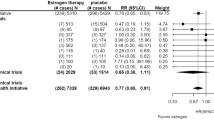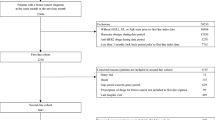Abstract
Background
The MA32 study investigated whether 5 years of metformin (versus placebo) improves invasive disease-free survival in early-stage breast cancer (BC). Non-adherence to endocrine therapy (ET) and medications for chronic conditions is common and increases with drug toxicity and polypharmacy. This secondary analysis evaluates rates and predictors of early discontinuation of metformin, placebo, and ET among participants with HR-positive BC.
Methods
Patients with high-risk non-metastatic BC were randomized to 60 months of metformin (850 mg BID) or placebo BID. Patients were administered bottles of metformin/placebo every 180 days. Metformin/placebo adherence was defined as a bottle dispensed at month 48 or later. The ET adherence analysis included patients with HR-positive BC who received ET with start and stop date reported, with adherence defined as > 48 months of use. Associations of covariates with study drug and ET adherence were examined using multivariable models.
Results
Among the 2521 HR-positive BC patients, 32.9% were non-adherent to study drug. Non-adherence was higher among patients on metformin vs placebo (37.1% vs 28.7%, p < 0.001). Reassuringly, ET discontinuation rates were similar between treatment arms (28.4% vs 28.0%, p = 0.86). Patients who were non-adherent to ET were more likely to discontinue study therapy (38.8% vs 30.1%, p < 0.0001). In a multivariable analysis, study drug non-adherence was increased with metformin vs placebo (OR: 1.50, 95% CI 1.25–1.80; p < 0.0001); non-adherence to ET (OR: 1.47, 95% CI 1.20–1.79, p < 0.0001); grade 1 or greater GI toxicity during the first 2 years; lower age; and higher body mass index.
Conclusion
While non-adherence was higher among patients on metformin, it was still considerable among patients on placebo. Reassuringly, treatment arm allocation did not impact ET adherence. Attention to global medication adherence is needed to improve BC and non-oncological outcomes in cancer survivors.
Trial registration
ClinicalTrials.gov: NCT01.



Similar content being viewed by others
Data availability
The data underlying this article are available upon request with approval from CCTG.
References
Early Breast Cancer Trialists' Collaborative G. Effects of chemotherapy and hormonal therapy for early breast cancer on recurrence and 15-year survival: an overview of the randomised trials. Lancet. 2005;365(9472):1687–1717.
Winer EP, Hudis C, Burstein HJ et al (2005) American Society of Clinical Oncology technology assessment on the use of aromatase inhibitors as adjuvant therapy for postmenopausal women with hormone receptor-positive breast cancer: status report 2004. J Clin Oncol 23(3):619–629
Hershman DL, Kushi LH, Shao T et al (2010) Early discontinuation and nonadherence to adjuvant hormonal therapy in a cohort of 8,769 early-stage breast cancer patients. J Clin Oncol 28(27):4120–4128
Chirgwin JH, Giobbie-Hurder A, Coates AS et al (2016) Treatment adherence and its impact on disease-free survival in the breast international group 1–98 trial of tamoxifen and letrozole, alone and in sequence. J Clin Oncol 34(21):2452–2459
Paranjpe R, John G, Trivedi M, Abughosh S (2019) Identifying adherence barriers to oral endocrine therapy among breast cancer survivors. Breast Cancer Res Treat 174(2):297–305
Rogala BG, Charpentier MM, Nguyen MK, Landolf KM, Hamad L, Gaertner KM (2019) Oral anticancer therapy: management of drug interactions. J Oncol Pract 15(2):81–90
Yang J, Neugut AI, Wright JD, Accordino M, Hershman DL (2016) Nonadherence to oral medications for chronic conditions in breast cancer survivors. J Oncol Pract 12(8):e800-809
Shin DW, Park JH, Park JH et al (2010) Antihypertensive medication adherence in cancer survivors and its affecting factors: results of a Korean population-based study. Support Care Cancer 19(2):211–220
Tan X, Feng X, Chang J, Higa G, Wang L, Leslie D (2016) Oral antidiabetic drug use and associated health outcomes in cancer patients. J Clin Pharm Ther 41(5):524–531
Calip GS, Xing S, Jun DH, Lee WJ, Hoskins KF, Ko NY (2017) Polypharmacy and adherence to adjuvant endocrine therapy for breast cancer. J Oncol Pract 13(5):e451–e462
Neugut AI, Zhong X, Wright JD, Accordino M, Yang J, Hershman DL (2016) Nonadherence to medications for chronic conditions and nonadherence to adjuvant hormonal therapy in women with breast cancer. JAMA Oncol 2(10):1326–1332
Goodwin PJ, Chen BE, Gelmon KA et al (2022) Effect of metformin vs placebo on invasive disease-free survival in patients with breast cancer: The MA.32 randomized clinical trial. JAMA 327(20):1963–1973
McCreight LJ, Bailey CJ, Pearson ER (2016) Metformin and the gastrointestinal tract. Diabetologia 59(3):426–435
Kirpichnikov D, McFarlane SI, Sowers JR (2002) Metformin: an update. Ann Intern Med 137(1):25–33
Flory JH, Keating SJ, Siscovick D, Mushlin AI (2018) Identifying prevalence and risk factors for metformin non-persistence: a retrospective cohort study using an electronic health record. BMJ Open 8(7):e021505
Accordino MK, Hershman DL. Disparities and challenges in adherence to oral antineoplastic agents. Am Soc Clin Oncol Educ Book. 2013:271–276.
Partridge AH, Wang PS, Winer EP, Avorn J (2003) Nonadherence to adjuvant tamoxifen therapy in women with primary breast cancer. J Clin Oncol 21(4):602–606
Greer JA, Pirl WF, Park ER, Lynch TJ, Temel JS (2008) Behavioral and psychological predictors of chemotherapy adherence in patients with advanced non-small cell lung cancer. J Psychosom Res 65(6):549–552
Gnant M, Dueck AC, Frantal S et al (2022) Adjuvant palbociclib for early breast cancer: The PALLAS trial results (ABCSG-42/AFT-05/BIG-14-03). J Clin Oncol 40(3):282–293
Mayer EL, Fesl C, Hlauschek D et al (2022) Treatment exposure and discontinuation in the PALbociclib CoLlaborative adjuvant study of Palbociclib with adjuvant endocrine therapy for hormone receptor-positive/human epidermal growth factor receptor 2-negative early breast cancer (PALLAS/AFT-05/ABCSG-42/BIG-14-03). J Clin Oncol 40(5):449–458
Funding
Dr Gelmon reported grants from CCTG per case funding during the conduct of the study. Dr Whelan reported nonfinancial support from Exact Sciences Genomic Health Research support outside the submitted work. Dr Lemieux reported serving as a consultant to Pfizer, Gilead, Astra Zeneca, Eli Lilly, and Novartis outside the submitted work. No other disclosures were reported. This work was supported by grants 021039 from the Canadian Cancer Society Research Institute; CA077202, CA180868, and CA180822 from the US National Cancer Institute; the Breast Cancer Research Foundation; Canadian Breast Cancer Foundation–Ontario Region; 10NOV-467 from the Ontario Institute for Cancer Research; 02689-08-2010 from the Stiftung Krebsforschung Schweiz KFS; Cancer Research UK; Apotex Canada (in kind donation of placebo and metformin); and the Hold’em for Life Charity, Toronto, Ontario, Canada. Dr. Hershman received funding from the Breast Cancer Research Foundation.
Author information
Authors and Affiliations
Contributions
Drs Hershman, Goodwin and Chen had full access to all of the data in the study and take responsibility for the integrity of the data and the accuracy of the analysis. Concept and design: Hershman, Goodwin, Chen, Lemieux, Ligibel, Sathe, Shepherd, Parulekar. Acquisition, analysis, or interpretation of data: Hershman, Goodwin, Chen, Gelmon, Whelan, Lemieux, Ligibel, Parulekar. Drafting of the manuscript: Hershman, Sathe, Goodwin, Chen, Parulekar. Critical revision of the manuscript for important intellectual content: All authors. Statistical analysis: Chen, Parulekar. Obtained funding: Hershman, Goodwin, Shepherd, Parulekar. Administrative, technical, or material support: Goodwin, Gelmon, Whelan, Lemieux, Parulekar. Supervision: Hershman, Goodwin, Parulekar.
Corresponding author
Ethics declarations
Conflict of interest
None.
Additional information
Publisher's Note
Springer Nature remains neutral with regard to jurisdictional claims in published maps and institutional affiliations.
Supplementary Information
Below is the link to the electronic supplementary material.
Rights and permissions
Springer Nature or its licensor (e.g. a society or other partner) holds exclusive rights to this article under a publishing agreement with the author(s) or other rightsholder(s); author self-archiving of the accepted manuscript version of this article is solely governed by the terms of such publishing agreement and applicable law.
About this article
Cite this article
Hershman, D.L., Chen, B.E., Sathe, C. et al. Metformin, placebo, and endocrine therapy discontinuation among participants in a randomized double-blind trial of metformin vs placebo in hormone receptor-positive early-stage breast cancer (CCTG MA32). Breast Cancer Res Treat 200, 93–102 (2023). https://doi.org/10.1007/s10549-023-06922-2
Received:
Accepted:
Published:
Issue Date:
DOI: https://doi.org/10.1007/s10549-023-06922-2




